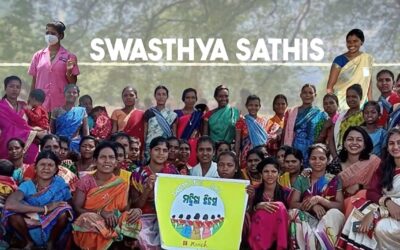Travelling from New Delhi, I was welcomed to Gramin Shiksha Kendra (GSK) office campus in Sawai Madhopur with the quintessentially autumn scent of shiulis, and a reminder of what fresh air on my face and in my lungs ought to feel like. Notably, with the nearby roads flanked by (unexpectedly lush) Aravalli Hills, the campus is located only a few kilometres away from expansive stretches of farmland and the famed tiger reserve. Soon, the process of moving cities and homes was all complete, and thus began the highly anticipated year-long saga of learning and unlearning about education at the grassroots.

A desk with a twist: my chosen work space on campus
Committed to enhancing access to quality child centric education in the villages surrounding the Ranthambore National Park, GSK runs three schools, programs for early childhood development and strengthening the agency of adolescent girls.
Before the 18th century, childhood was often considered merely a stage of weakness and immaturity to be got through as quickly as possible. Accordingly, modern child-centric education tends to trace its origins to only as far back as the Romantic movement, and Jean-Jacques Rousseau, in particular. Rousseau had considerable influence on educational thought through his novel Emile. He believed in the ‘natural goodness’ and value of the child. He wanted education to be adapted to each new developmental stage and placed great emphasis on the importance of the child’s participation or active involvement in the process.
Also Read: The Age Of Educational Romanticism
Keeping aside my personal incessant need to take everything back to old political philosophers, why are Rousseau’s thoughts on education relevant today? Traditionally, teachers have been at the centre of the learning process, and students have assumed passive roles of reception. However, with the emergence of research that highlights the myriad styles through which people learn and the improbability of a singular cookie-cutter method of teaching being successful, conventional curriculum approaches to instruction have begun to evolve.
Among key changes is
the recognition of the idea that
students actively construct their own learning.
GSK’s Uday Community Schools, recognised as ‘Change-maker Schools’ by the Ashoka Foundation, have adopted a multi-grade/multi-level pedagogy, such that teaching approaches are tailored to the varied needs of different students in a group, and assessments consider relative progress, rather than the fulfilment (or lack thereof) of a singular all-applicable criterion. Teachers ensure the maintenance of personal relationships with each student and their family, to be equipped to provide meaningful support, relevant to their unique challenges and aspirations.
Learning here is contextual and the curriculum is designed to pertain to the everyday realities of life in rural Rajasthan. Also committed to an experiential approach, conventional classroom teaching is corroborated by activities’ clubs and project-work that promote the development of hands-on skills.
Notably, the pandemic has strengthened the organisation’s belief that it is crucial to undertake efforts that enhance the agency of adolescent girls by augmenting their academic levels, health status and life skills. To that end, the Umang program is committed to its cohort of girls. Within this program, the team members are conducting regular visits to ensure well-being and encouragement at home, as well as classroom sessions focusing on school subjects, digital literacy and life skills development. For younger students, while the Uday Schools are currently closed, in line with Covid safety guidelines, smaller learning centres are being run across villages in the catchment area of the schools.
Two of the several community learning centres set up to ensure continued academic and co-curricular engagement of students, who are from under-resourced households and at risk of dropping out in case of a prolonged break from schooling.
GSK considers its schools and programs as ‘fish bowl laboratories‘, constantly experimenting and evolving to attain and sustain quality, while holding itself accountable to, and in collaboration with, village communities. The community members are encouraged to inculcate a sense of collective ownership towards institutions of their children’s education. This is to usher in a culture that perceives education as a vital and non-negotiable aspect of children’s lives, in an attempt to tackle socio-economic systems that keep children out of schools. Taking a step forward during the pandemic, while identifying accessible locations to set up learning centres, families offered space in their homes, for the purpose of teaching sessions.

The porch of her large joint family home is a haven for learning, playing and socializing for many children of her village.
The cognitive stress induced by their social positions and circumstances often disallows the children from exploring and developing their own voices, identities and potentials. What makes me most excited about GSK’s work, therefore, is the attention given to creating spaces for expression- either creatively through the bi-monthly students’ magazine, or by allowing for questioning and sharing during classroom activities.
Critically thinking, confidently opining and actively seeking answers that satiate their curiosity are characteristics being looked to imbibe in young people – a process I’m keen to find my space in during the rest of the year, and beyond.
Gramin Shiksha Kendra is reimagining education, especially to overcome the Covid-induced impediments to access. You may support the journey here!






0 Comments